
On the night of Jul 04/05, 2014, I observed the cataclysmic variable stars ASAS-SN14cv and ASAS-SN14cl. You can read more about these stars, which were both discovered only recently, at
The amplitude of periodic variation in both stars has decreased considerably. ASAS 14cl has faded to around V = 14.8.
The main setup was:
Notes from the night
Below is a graph showing the sky brightness as a function of time during the observing run.

Below is a graph showing the FWHM as a function of time during the observing run.
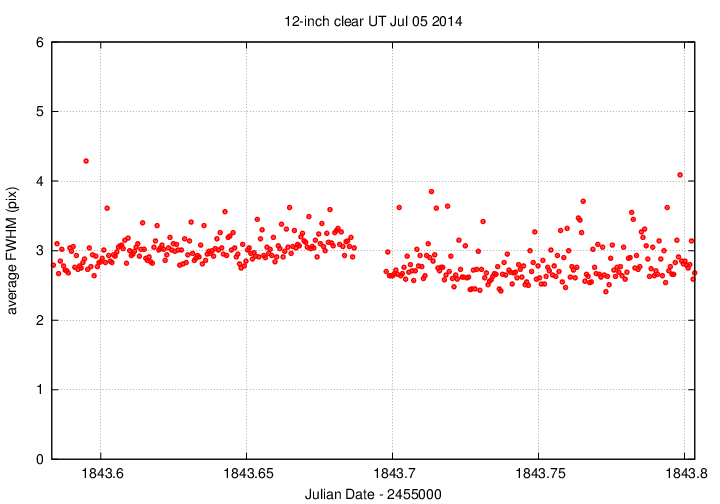
Here's a chart of the field of ASAS-SN14cv, which is at
RA = 17:43:48.58 Dec = +52:03:46.8 (J2000)
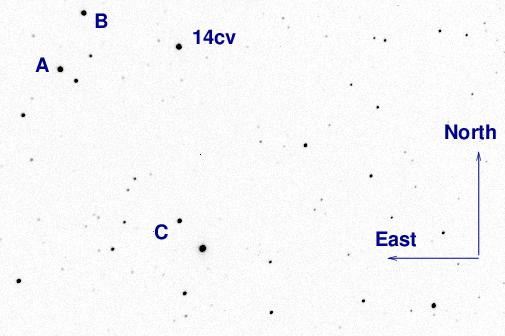
Some of the reference stars marked above have magnitudes in the UCAC4. Specifically, star "A" above is
The television camera on the finder scope shows the following when we're pointed at ASAS-14cv. North up, East left, field about 1 degree on a side.

Image adjustment factors show very minor bumps due to light clouds.

Using aperture photometry with a radius of 4 pixels (radius of 7.4 arcsec), I measured the instrumental magnitudes of a number of reference stars and the target. Following the procedures outlined by Kent Honeycutt's article on inhomogeneous ensemble photometry, I used all stars available in each image to define a reference frame, and measured each star against this frame. I used the UCAC4 V-band magnitude of star "A" to convert the ensemble instrumental magnitudes to a reported "V"-band magnitude (but remember, it's a clear filter).
Sigma-vs-mag plot:
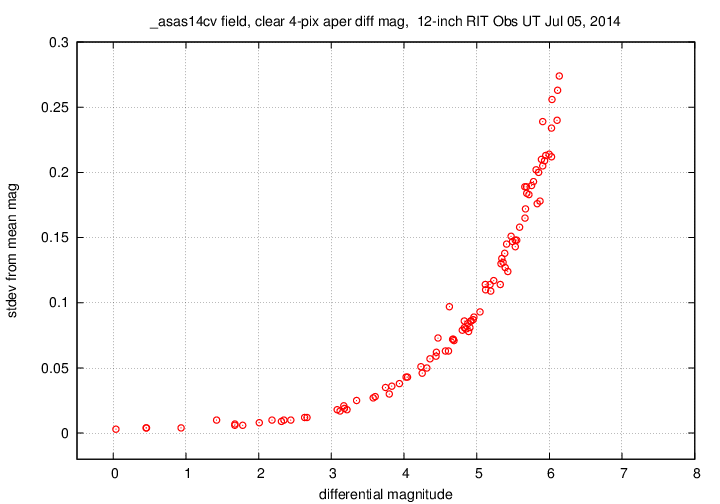
The target had a "V"-band magnitude of roughly 12.9.
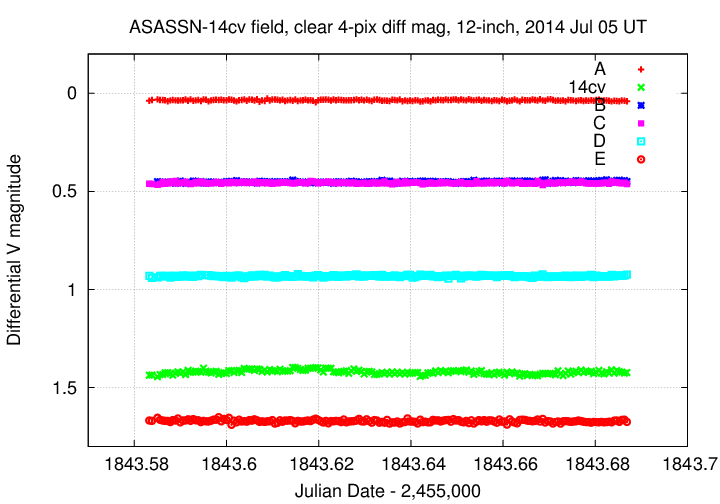
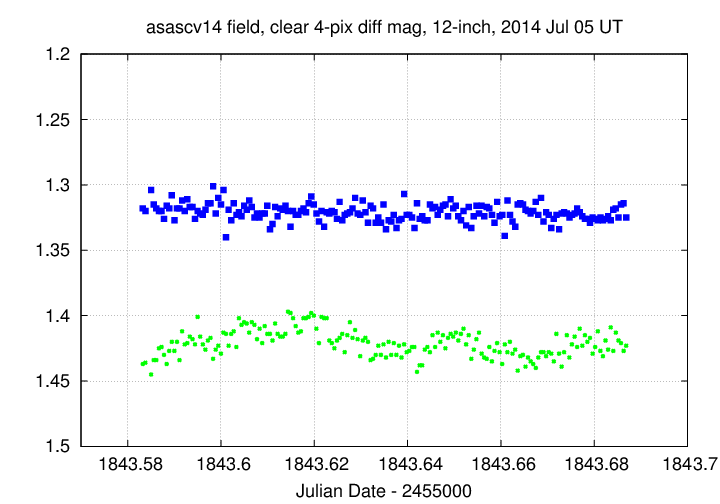
You can see my measurements of the star in the ASCII text file below. The first few lines are shown here:
# Measurements of ASAS_SN14cv made at RIT Obs, Jul 5, 2014 UT, # in fair conditions, # by Michael Richmond, using 12-inch Meade and SBIG ST-8E CCD. # Exposures 30 seconds long, no filter. # Tabulated times are midexposure (FITS header time - half exposure length) # and accurate only to +/- 1 second (??). # 'mag' is a differential magnitude based on ensemble photometry # using a circular aperture of radius 7.4 arcseconds. # which has been shifted so UCAC4 711-058151 has mag=11.518 # which is its V-band mag according to UCAC4. # # UT_day JD HJD mag uncert Jul05.08325 2456843.58325 2456843.58462 12.920 0.007 Jul05.08381 2456843.58381 2456843.58518 12.919 0.007 Jul05.08503 2456843.58503 2456843.58640 12.928 0.007
Here's a chart of the field of ASAS-SN14cl, which is at
RA = 21:54:57.62 Dec = +26:41:16 (J2000)
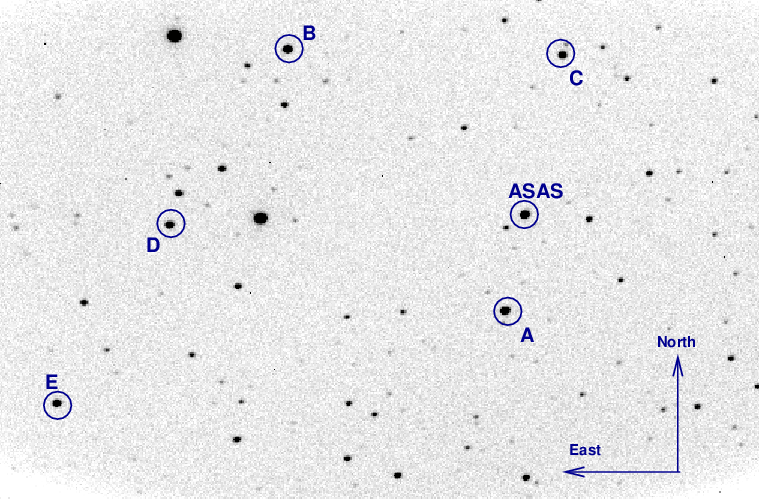
Some of the reference stars marked above have magnitudes the UCAC4 AAVSO chart 13493SS. Specifically, star "B" above is
The television camera on the finder scope shows the following when we're pointed at ASAS-14cl. North up, East left, field about 1 degree on a side.
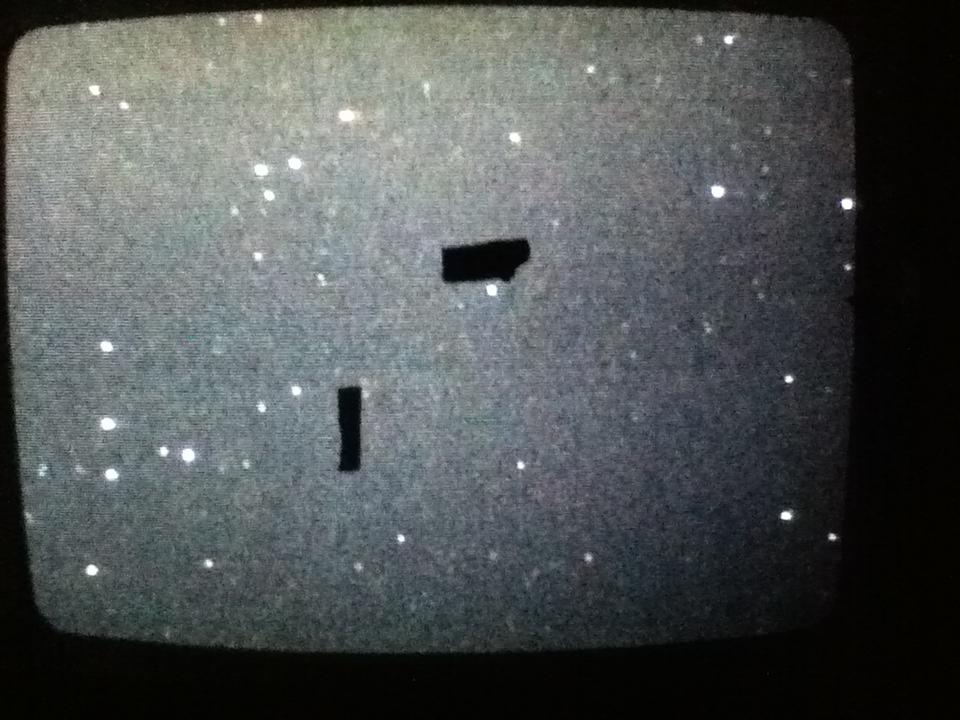
Conditions were good.
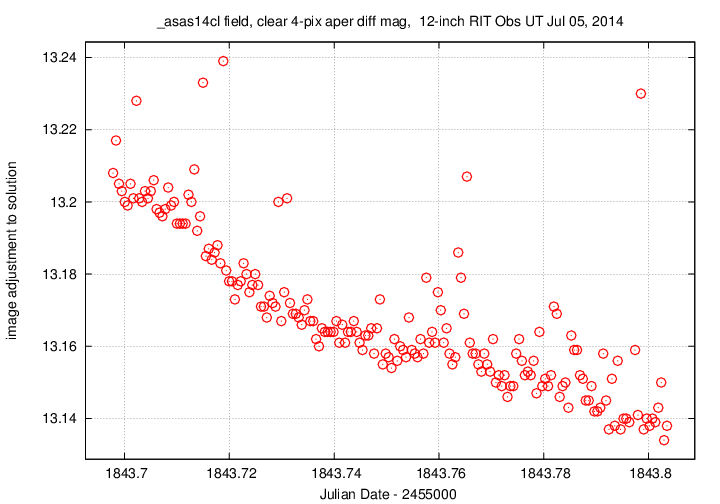
Using aperture photometry with a radius of 4 pixels (radius of 7.4 arcsec), I measured the instrumental magnitudes of a number of reference stars and the target. Following the procedures outlined by Kent Honeycutt's article on inhomogeneous ensemble photometry, I used all stars available in each image to define a reference frame, and measured each star against this frame. I used the AAVSO V-band magnitude of star "B" to convert the ensemble instrumental magnitudes to a reported "V"-band magnitude (but remember, it's a clear filter).
The target is the star with large scatter around instrumental mag 2.8.

The target had a "V"-band magnitude of roughly 14.8, more than 1.5 mag fainter than 4 nights ago.
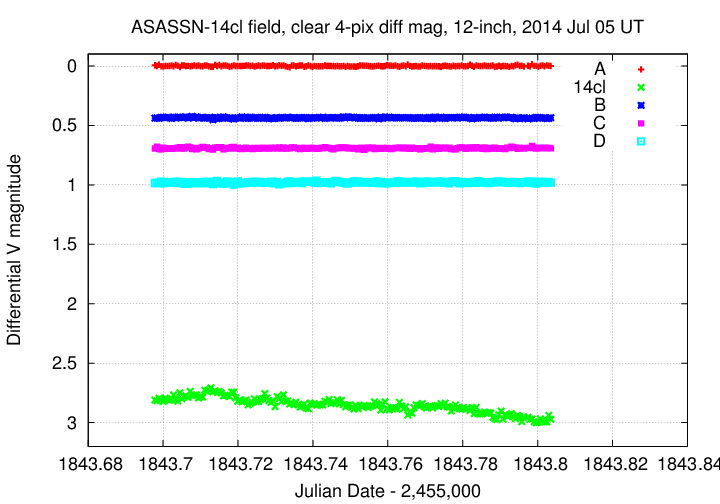
Grab the text file below for all the RIT measurements of ASAS-SN14cl. The header of the file is shown below.
# Measurements of ASAS_SN14cl made at RIT Obs, Jul 5, 2014 UT, # in good conditions, # by Michael Richmond, using 12-inch Meade and SBIG ST-8E CCD. # Exposures 30 seconds long, no filter. # Tabulated times are midexposure (FITS header time - half exposure length) # and accurate only to +/- 1 second (??). # 'mag' is a differential magnitude based on ensemble photometry # using a circular aperture of radius 7.4 arcseconds. # which has been shifted so UCAC4 584-123918 has mag=12.335 # which is its V-band mag according to AAVSO chart 13493SS. # # UT_day JD HJD mag uncert Jul05.19782 2456843.69782 2456843.70023 14.709 0.020 Jul05.19838 2456843.69838 2456843.70079 14.716 0.020 Jul05.19894 2456843.69894 2456843.70135 14.694 0.022
Last modified 7/05/2014 by MWR.